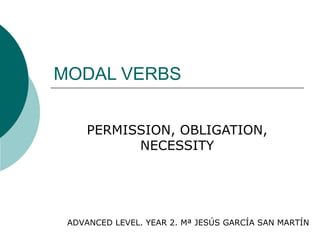
Modal verbs: permission, necessity, obligation
- 1. MODAL VERBS PERMISSION, OBLIGATION, NECESSITY ADVANCED LEVEL. YEAR 2. Mª JESÚS GARCÍA SAN MARTÍN
- 2. can, must, should, ought to, had better The negative is had better not NOT hadn’t better . The most common modal verbs for talking about permission and obligation are can/could , must , and should/ought to . I couldn’t take any photos in the museum, so I bought some postcards. Passengers on the bus mustn’t distract the driver. We should / ought to drive home on the motorway – it’s much quicker. We can use should have or ought to have + past participle to talk about past events which did not happen and which we regret. We should have / ought to have driven home on the motorway – it would have been quicker. Had better is stronger and more urgent than should/ought to and is often used to give strong advice or a warning. It normally refers to the immediate future. You ’d better post the parcels today or they won’t get there in time .
- 3. have to/have got to We also use have to to express obligations. It can be used in any tense. All passengers will have to fill in a form before landing. You don’t have to tip the waitress unless you think the service was especially good. We can also use have got to to express obligation, but it is normally used for specific occasions rather than repeated or general obligations. I ’ve got to buy a birthday present for my brother.
- 4. need We use need/don’t need + to + infinitive to say that something is necessary/ unnecessary. You can use these forms for habitual, general, and specific necessity. You usually need to check in at least two hours before a flight leaves. I don’t need to take a raincoat. It’s going to be hot today. When we want to say that something is unnecessary on a specific occasion, we can also use needn’t + infinitive without to . You needn’t lock the car. Nobody will steal it in this village. We use don’t need to ( NOT needn’t ) for habitual or general necessity, e.g. I don’t need to wear glasses. My eyesight is still good. NOT I needn’t wear glasses .
- 5. need When something was not necessary, but you did it, we can use either needn’t have + past participle or didn’t need to + infinitive . We needn’t have booked / didn’t need to book a table. The restaurant is empty! When something was not necessary so you did not do it, we must use didn’t need to . NOT We had plenty of petrol so we needn’t have stopped, which saved time . We had plenty of petrol so we didn’t need to stop , which saved time.
- 6. be able to, be allowed to, be permitted to, be supposed to We often use be able to or be allowed to + infinitive to talk about what is possible or permitted instead of can , particularly when we want to use a form which can does not have. From tomorrow we won’t be able to park here. You ’re not allowed to smoke in the classroom. be permitted to + infinitive is used in formal situations, e.g. notices and announcements, to say what can/can’t be done according to the law or to rules and regulations. It is not permitted to take mobiles into the exam room. ! We do not use it followed by be allowed to . NOT It isn’t allowed to take mobiles into the exam room .
- 7. be able to, be allowed to, be permitted to, be supposed to Adapted from Resource Bank. New English File Advanced. We can also use be supposed to + infinitive to say what people should or shouldn’t do, often because of rules. There is often a suggestion that the rules are not necessarily obeyed, e.g. Students are not supposed to stay out after 12.00, but everyone does. We are supposed to check in at 3.50. What’s the time now? You aren’t supposed to park here – it’s a surgery entrance.
